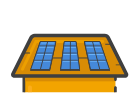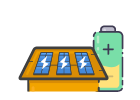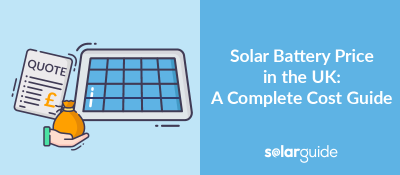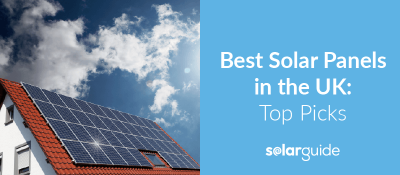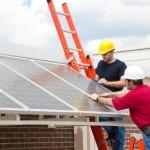Are Solar Panels Worth It In The UK? Savings + Payback Time
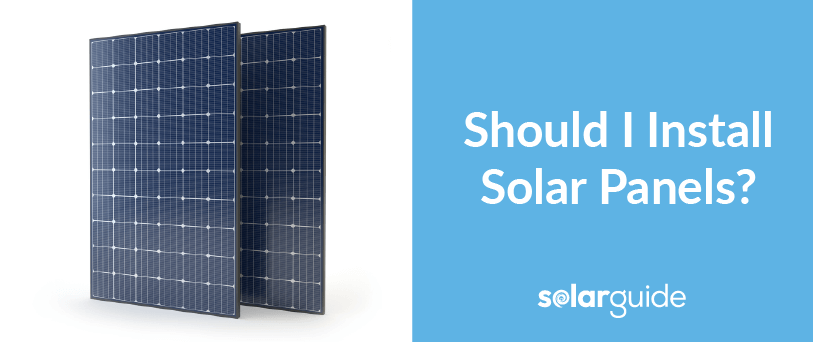
Visualise a world where your electricity bills are significantly reduced, and you have the satisfaction of knowing you’re contributing to a cleaner and greener environment. Solar panels and solar roof tiles have become increasingly widespread in the UK and for a good reason. They offer many benefits, from cost savings to a reduced carbon footprint. If you’re considering investing in solar panels, you may wonder if they are worth it and how long will it take for your investment to pay off?
In this article, we’ll delve into solar panels, exploring the savings they can bring and the payback time you can expect.
But first, we also understand that researching professional solar panel installers can be a time-consuming and daunting task. Finding a reliable and reputable installer who can guarantee the best service and value for your money is essential. That’s why our service is designed to remove the stress and hassle of searching all over the internet for the perfect installer without getting anywhere.
We allow you to compare prices and save by offering up to 4 quotes within 48 hours. By selecting our service, you can rest assured that you’re making the right decision for your solar panel installation. We work with a network of trusted and experienced installers who are committed to delivering exceptional service and top-quality installations. Whether you’re a homeowner or a business owner, our comprehensive quote service ensures you access the best prices and options available in the market.
The best part? Our quotes are completely free and come without any obligations. You have the freedom to explore your options and make an informed decision without any pressure. We believe in empowering our customers with the knowledge and resources they need to make the best choice for their solar panel investment. So, click the bottom below to get started!
Get Free Solar Panel Quotes: Get quotes and compare prices.
How much do solar panels cost?
To determine if solar panels are worth it, you first have to know how much solar panels cost. Investing in solar energy is not only about the long-term savings and environmental benefits; it’s also about understanding the upfront expenses involved.
To provide you with a clear picture, let’s explore the costs associated with different solar photovoltaic system sizes. The table below presents estimated costs for solar panel installations based on the system size, ranging from 3kW to 6kW.
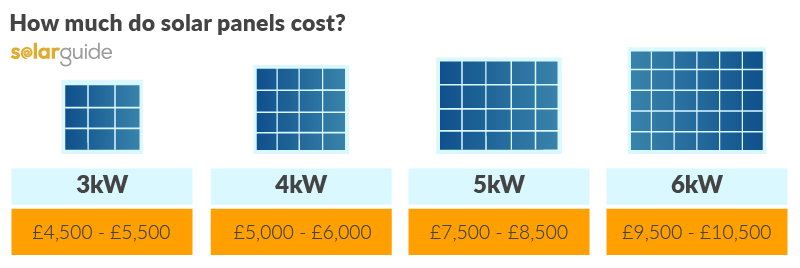
Please note that these costs are only estimates and can vary based on several aspects, such as the type of panels, installation complexity, and additional equipment required. It’s always recommended to obtain quotes from reputable installers with Solar Guide to get a more accurate estimate tailored to your specific needs.
Now, let’s address the emotional aspect of investing in solar panels. While the upfront cost may seem substantial, looking at the long-term benefits and the positive impact you can make on the environment is crucial. Solar panels provide you with substantial savings on your electricity bills and allow you to become more self-sufficient and reduce your carbon footprint.
How many solar panels do you need?
Determining the number of solar panels required for your installation is crucial in understanding the costs and benefits associated with solar power. Your system size will depend on various factors, such as your energy consumption, available roof space, and budget. Let’s explore the different system sizes, ranging from 3kW to 6kW, to help you determine how many solar panels you need.
Let’s examine the number of solar panels typically required for each system size to provide a clear overview. The table below illustrates the number of panels needed for installations.
| System Size | Number of Panels (Approximate) |
|---|---|
| 3kW | 10 panels |
| 4kW | 11-12 panels |
| 5kW | 13- 14 panels |
| 6kW | 16-17 panels |
How do you determine the appropriate system size for your energy needs? Several factors come into play when deciding on the size of your solar panel system. Firstly, consider your average monthly electricity consumption. This report can typically be found on your electricity bills or by contacting your energy provider.
Understanding your energy usage patterns will help you estimate the system size required to cover a significant portion of your electricity needs. The available roof space and the number of people using it are also vital in determining the number of solar panels you can install.
Additionally, discussing your goals with a solar panel installer can help determine the appropriate system size and optimise your solar panel investment. So, getting a quote from Solar Guide will reduce the stress of searching for installers online. We also excel in connecting you to professional installers in your area who can offer lower rates and a more personalised service.
By getting multiple quotes, you can accurately assess your requirements and determine the appropriate system size for your solar panel installation. Remember, you can get up to 4 quotes from installers on our network within 48 hours, and their quotes are completely free without any obligations.
Click the button below to get started!
Get Free Solar Panel Quotes: Get quotes and compare prices.
Solar panel grants to help lower your costs
The good news is that several solar panel grants and financial incentives are available that can significantly lower your costs and make going solar more affordable.
Home Energy Scotland Programme
The Home Energy Scotland Programme provides free advice, support, and financial assistance to homeowners in Scotland. Through this program, eligible homeowners can receive grants up to £7,500 each and loans to help cover the costs of energy efficiency improvements, including solar panel installations. The programme was launched in 2008 and is currently scheduled to run until 2030.
The Home Energy Scotland Programme’s eligibility criteria vary depending on the funding type you are applying for. However, some general eligibility criteria apply to all types of funding.
- You must be a homeowner, private tenant, or social housing tenant in Scotland.
- You must have lived in your home for at least 6 months.
- You must have a household income below £30,000.
- Your home must have a poor energy rating.
- A Home Energy Scotland advisor or an EPC must recommend the energy-saving improvements you are proposing.
- The installer and product must be certified under the Microgeneration Certification Scheme (MCS) for the system that is being installed.
Smart Export Guarantee (SEG)
The Smart Export Guarantee is a government scheme that ensures you receive payment for excess electricity generated by your solar panels and exported back to the grid. Energy suppliers are required to offer SEG tariffs, allowing you to earn money for the surplus energy you produce. The SEG was launched in January 2020, but it will operate for at least 20 years and could be extended beyond that.
On a 5.5p per kWh tariff, the average owner of a three-bedroom home with a 4kW solar panel installation will save up to £700 per year via the Smart Export Guarantee. This financial incentive helps offset the cost of your solar panel installation and generates additional income over time.
The necessary data and paperwork to have in advance before applying:
- A readout from a smart meter or a half-hourly export meter. SEG licensees must complete your application using the most recent meter readings.
- Your MCS credential (or equivalent)
- As evidence of ownership, most licensees mandate that the system owner must be the SEG tariff receiver.
- The form for applications. On the website of the SEG.
- A unique, extra form for anaerobic digestion. On the website of Ofgem, you may find this.
After submitting your application, you should allow 28 days for processing.
Energy Company Obligation (ECO4)
The Energy Company Obligation is a scheme designed to help lower-income and vulnerable households reduce their energy bills and improve energy efficiency. Under this program, qualifying households may be eligible for grants and support to install energy-efficient measures, including solar panels. The ECO4 scheme aims to make energy-saving improvements more affordable and accessible to those who need it most. The scheme was launched on 1 April 2022 and will run until 31 March 2026.
ECO4-eligible benefits?
ECO4 advantages are:
- Child Tax Credits
- Housing Benefit
- Income Based Employment and Support Allowance (ESA)
- Income-Based Jobseekers Allowance (JSA)
- Income Support
- Pension Credit (Guarantee Credit)
- Pension Credit (Savings Credit)
- Universal Credit
- Working Tax Credits
Suppose you received a favourable award within the previous 18 months before the grant installation. In that case, you are eligible to apply without having to make a claim right now. This will be a huge relief for Universal Credit claimants who receive variable monthly payments and only sometimes receive benefits.
Please be aware that applying for Child Benefits will also qualify you. Still, if that is all you get, you must also fulfil the following income requirements:
The yearly family income restrictions shown below are applicable if your child benefit claim is for a single adult:
- 1 child: £19,800
- 2 children: £24,600
- 3 children: £29,400
- 4 or more children: £34,200
Couples’ Child Benefit yearly household income restrictions are:
- 1 child: £27,300
- 2 children: £32,100
- 3 children: £36,900
- 4 or more children: £31,700
Home Upgrade Grant
The Home Upgrade Grant is a UK government initiative to promote energy efficiency and renewable energy adoption. Through this grant, homeowners may be eligible for financial support to upgrade their homes with energy-saving measures, including solar panel installations. The grant encourages individuals to invest in sustainable technologies, reducing energy consumption and carbon emissions.
The Home Upgrade Grant (HUG) offers grants of up to £10,000 towards the cost of energy efficiency improvements in homes in England The HUG was launched in April 2022 and is scheduled to run until March 2025.
Your home must meet certain criteria to be eligible for funding under the HUG. These criteria include:
- Your home must be off the gas grid.
- Your home must have an EPC rating of D-G.
- You must be the owner or tenant of the property.
- You must have lived in the property for at least six months.
- Your household income must be below £30,000.
Social Housing Decarbonisation Fund: The Social Housing Decarbonisation Fund focuses on decarbonising social housing properties across the UK. This fund provides financial support to housing associations and local authorities to improve energy efficiency, including solar panel installations.
The fund was launched in 2021 and is scheduled to run until 2025. The amount of funding available under the SHDF varies depending on the size and complexity of the project. However, registered providers generally expect to receive a grant of between £50,000 and £2 million.
Who can apply?
To increase the energy efficiency of their social dwellings, local authorities or registered social housing providers that are part of a consortium managed by local authorities can submit financing proposals. The project must be under the competition’s purview, be situated in England, and be under the direction of a local government.
Warmer Homes Scotland
Warmer Homes Scotland is a government-funded scheme to improve the energy efficiency of homes in Scotland. Under this program, eligible households can receive financial support for various energy-saving measures, including solar panel installations. The scheme aims to tackle fuel poverty, improve energy efficiency, and reduce carbon emissions by making homes warmer and more affordable to heat.
Warmer Homes Scotland offers grants of up to £5,000 to help eligible households in Scotland. The scheme was launched in 2008 and is currently scheduled to run until 2030. However, the funding is expected to run out sooner than that, so it is important to apply early if you are interested in receiving a grant.
Your home must meet specific criteria to be eligible for funding under Warmer Homes Scotland. These criteria include:
- Your home must be in Scotland.
- Your home must have an Energy Performance Certificate (EPC) rating of D or below.
- You must be the owner or tenant of the property.
- You must have lived in the property for at least six months.
- You must meet certain income criteria.
By knowing more about your eligibility for these solar panel grants and financial incentives, you can significantly reduce the installation costs.
Now you know if you are eligible for the available grants listed above, let Solar Guide connect you with the best installers in your area who can deliver quality work for your solar installation. You may be wondering how you can do that. Don’t worry. This is simple. Just click on the button below to get up to 4 quotes from us to compare in less than 48 hours, tailored to your solar panel needs.
Remember, our service is totally free, and you are not under any obligation to accept any quote provided to you. In this case, you can make a knowledgeable decision in your journey to renewable energy, and ensure you don't get overcharged. Click the button below to take advantage of these opportunities.
Get Free Solar Panel Quotes: Get quotes and compare prices.
How much money do solar panels save?
The money you can save depends on various factors, including the system size, solar panel efficiency, and energy consumption. Let’s explore the potential savings from different system sizes of solar panel installations.

These estimates are based on average solar panel efficiencies and typical energy consumption patterns. It’s important to note that the actual savings may vary depending on details such as your solar panel location, electricity rates, and the orientation and shading of your roof.
Solar panel payback time: How long does it take to break even?
While the payback time can vary based on several factors, such as system size, solar panel efficiency, and local conditions. A general estimate is around 10 years. But first, let’s understand the dynamics of solar panel payback time factors stated above.
| System Size | Estimated Payback Time (Year) |
|---|---|
| 3kW | 9 |
| 4kW | 8 |
| 5kW | 10 |
| 6kW | 10 |
Factors influencing payback time:
- System Size: The size of your solar panel system plays a significant role in determining the payback time. Generally, larger systems tend to have shorter payback periods due to higher electricity generation and subsequent savings.
- Solar Panel Efficiency: The efficiency of solar panels influences the amount of electricity they can generate from sunlight. Higher efficiency panels can generate more electricity, accelerating the payback time by increasing energy savings.
- Energy Consumption: Your energy consumption patterns directly impact the payback time. The more electricity you consume, the faster you can offset your investment through savings on your energy bills.
Do solar panels increase the value of my home?
Solar panels increase the value of a home by providing energy savings, environmental appeal, and competitive advantage. Solar panels make your property more attractive to potential buyers. A research by Zillow found that solar panels on a home typically improve its appraised value by 4.1%.
To maximise the value added by solar panels, it is important to ensure high-quality installation, properly maintain the system, and work with professionals who understand the value of solar-equipped properties. Embrace solar power not only for its environmental benefits but also for its potential to enhance the value of your home.
If you live are looking to install solar panels for apartments or flats, this may be a good way to convince your landlord or building owners. We also recommend checking for what codes or regulations apply to your building before installing panels.
Saving on solar panels: Are cheap solar panels worth it in the UK?
Quality and long-term performance are crucial for maximising the benefits of solar panel installations. Let’s discuss the pros and cons of cheap solar panels in the UK to help you make an informed decision.
Pros of cheap solar panels
- Initial Cost Savings: Cheap solar panels may offer a lower upfront cost compared to higher-quality alternatives. This can make them more accessible for homeowners with limited budgets.
- Short-Term Payback: Due to the lower initial cost, cheap solar panels may have a shorter payback period. This means you may recoup your investment through energy savings in a relatively shorter timeframe.
Cons of cheap solar panels
- Reduced Efficiency: Cheap solar panels often have lower efficiency ratings, meaning they generate less electricity from the same amount of sunlight. This can result in lower energy production and potentially reduce your overall savings over the system’s lifespan.
- Durability and Longevity: Cheap solar panels are typically made with lower-quality materials and may not withstand the test of time as well as higher-quality panels. They may be more prone to wear, degradation, and potential failure, resulting in a shorter lifespan and reduced performance.
- Compatibility and Standards: Cheap solar panels may not meet the required standards and certifications, potentially leading to compatibility issues with other system components and grid connection requirements. This can add sophistication and additional costs to your solar panel installation.
Ultimately, the answer to whether cheap solar panels are worth it depends on your exact circumstances and priorities. While cheap panels may provide initial cost savings, it’s essential to consider the long-term implications, including energy production, system longevity, and potential maintenance or replacement costs.
Remember, when it comes to solar panels in the UK, where weather conditions can be variable, the focus should be on long-term value and maximising your energy savings. Don’t let the allure of cheap panels overshadow the importance of quality and performance.
Our network of expert installers can guide you through the process, helping you find the right balance between cost and quality. Don’t compromise on the benefits of solar power-click on the button below to explore your options and receive a free, no-obligation quote.
Get Free Solar Panel Quotes: Get quotes and compare prices.
Should I get solar panels in the UK in 2023?
Yes. Due to the persistent increase in the number of homes, and investing in solar panels in the UK, 2023 is a promising time to leap sustainable energy. Solar panels have become attractive for homeowners and businesses with advancing technology, favourable government incentives, and increasing environmental awareness.
While the decision to install solar panels is generally favourable, a few exceptions exist. If you plan to sell your home within the next 5 years, the financial benefits may not outweigh the initial investment costs. However, if you intend to stay in your current residence for a longer period, solar panels can offer substantial savings and increased property value.
For businesses, the benefits of solar panels in 2023 are equally compelling. Commercial properties can enjoy reduced operating costs through energy savings and enhance their brand image by showcasing their commitment to sustainability and environmental responsibility.
Compare solar panel quotes
With countless providers offering a wide range of products and services, it can be tough to make a confident decision. That’s where comparing solar panel quotes comes in. By comparing quotes, you can ensure you’re getting the best value for your money, and that you're not overpaying.
One of the primary benefits of comparing solar panel quotes is the potential for cost savings and transparency. Each solar panel installation company will offer different pricing structures and discounts. By comparing multiple quotes, you can identify the most competitive prices available and assess the specifications, warranties, and additional services included in each quote. This allows you to find the best balance between affordability and quality, ensuring you get the most value for your investment. But this process will take time and not guarantee getting the best installer, if you do it on your own.
Fortunately, this is something we can help with. Our expertise and network of reputable installers make the process simple and efficient. Empower yourself with the knowledge and options necessary to make an informed decision by requesting your free, no-obligation quotes. Compare, save, and embrace the benefits of getting up to 4 quotes for solar energy installation for free with no obligation. Get peace of mind and avoid hassle with Solar Guide by your side. Click the button below to get started!
Get Free Solar Panel Quotes: Get quotes and compare prices.
Frequently asked questions
Is it profitable getting solar panels in the UK?
Yes, getting solar panels in the UK can be profitable. Solar panels generate clean energy, which reduces or eliminates your electricity bills, resulting in long-term cost savings. Additionally, you can earn money by selling excess electricity back to the grid through government incentive programs like the smart export guarantee. Solar panels have become a financially viable and environmentally friendly investment with decreasing installation costs and favourable government support.
How quickly do solar panels pay for themselves?
The payback period for solar panels varies depending on installation cost, energy consumption, and available incentives. On average, solar panels in the UK have a payback period of around 8 to 12 years. However, this can vary significantly based on individual circumstances.
Do the pros outweigh the cons of solar panels?
The pros of solar panels typically outweigh the cons. The benefits include reduced electricity bills, a lower carbon footprint, increased energy independence, potential income from excess energy generation, and added property value. Solar panels are a reliable and sustainable source of energy that can help combat climate change and contribute to a cleaner environment.
Will solar panels become a better investment in the future?
Solar panels are expected to become an even better investment in the future. As technology advances, solar panel efficiency continues to improve, resulting in higher energy production from smaller panel sizes. This leads to increased cost-effectiveness and quicker payback periods. With ongoing research and development, solar panels are poised to become an increasingly attractive and profitable investment option in the coming years.
Find local, MSC certified Solar Installers
Start your quote
Find local, MSC certified Solar Installers






